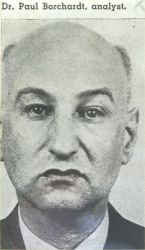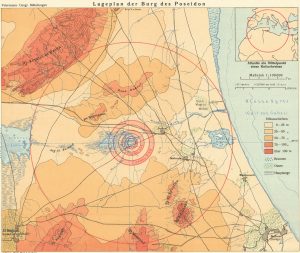Borchardt, Theodor Paul
Dr Paul Theodor Borchardt (1886-1957) at the very least could never have claimed to have lived a dull life. He came from a Jewish family but adopted Theosophy, publishing a commentary on Blavatsky’s Isis Unveiled while still in his early  twenties. He joined the German army and served in the Middle East during the First World War, working as a pilot and spy. After that war, he explored Tunisia, which led to his contribution to Atlantology.
twenties. He joined the German army and served in the Middle East during the First World War, working as a pilot and spy. After that war, he explored Tunisia, which led to his contribution to Atlantology.
>Borchardt studied under Professor Siegfried Passarge and when Borchard later proposed that the chotts of northwest Africa held the remains of Plato’s Atlantis, Passarge investigated the claim and expressed some reservations. Passarge was a rabid anti-Semite, but at that time does not appear to have been aware of Borchardt’s ancestry.<
Later, in 1929 he became a professor of military geography in Munich, but, his Jewish background led to his dismissal in 1933 and later in 1938 was sent to the Dachau concentration camp. Intervention by a relative led to his release and emigration to Britain in 1939. MI5 were impressed by his wartime exploits and his anti-Nazi outlook.
However, Borchardt travelled to the United States and quite incredibly was recruited as a German spy by the infamous Kurt Frederick Ludwig who was already under surveillance by the authorities. When the so-called Joe K spy ring was broken up Borchardt was sentenced to 20 years in prison, narrowly avoiding the death penalty. Once again through the influence of friends he got an early release and a pension.
Letters relating to his wartime activities can be read online(c)(d).
Borchardt was convinced that Atlantis had been located in North Africa(a). He particularly favoured an area between the Chott el Jerid and the Gulf of Gabés, off Tunisia. James Bramwell notes[195.115] that Borchardt recorded the location as Ham Mam and that he had deduced that the salt lake, Chott Hammeina, was once called the “Lake of the Atlantes”, formerly known as Lake Tritonis. El Hamma (Al Hammah) is a town 30km west of Gabès.>Sprague de Camp noted [194.191] that Borchardt identified ancient Mt. Atlas with the Ahaggar Mountains rather than the Atlas range in the Maghreb!<
The topography of the region together with the ruins of an ancient city near Gabés that Borchardt discovered along with traces of irrigation canals, as well as a huge concentric feature, convinced Borchardt that he had identified Plato’s Atlantis. He believed that the Pillars of Hercules were not the mountains on either side of the Strait of Gibraltar but instead were actual pillars in a temple of Hercules in the at the Gulf of Gabés near the entrance to the chotts.
It may be worth mentioning that the Maltese archipelago, just north of Tunisia, also had an ancient temple dedicated to Hercules.
Borchardt differentiated between the island of Atlantis and the location of the citadel of Poseidon. He identified similarities between Berber tribal names and the ten kings of Atlantis e.g. Plato refers to the founder of the royal house of Atlantis as Euenor, which is claimed to be echoed in the name of Uenur, the mythical father of all the Berbers.
His views were published in 1927 in a couple of articles[190][191] written in German.
A 1928 newspaper report(b) is also worth a look.
(a) https://atlantisforschung.de/index.php?title=Paul_Borchardt:_Atlantis_in_Tunesien (german)
(b) https://trove.nla.gov.au/ndp/del/article/1230945
(c) http://www.fjexpeditions.com/frameset/borchardt.htm
(d) Paul Theodor Borchardt (1886 – 1957) – Genealogy (geni.com)

